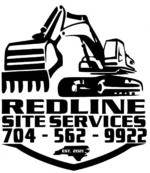Commercial properties in Marshville require specialized septic systems to handle high wastewater volumes while protecting local ecosystems. Unlike residential setups, these systems must meet stricter codes and accommodate heavy usage. This guide covers key factors for business owners, from permits to maintenance.
Why Commercial Septic Systems Differ from Residential Ones
Commercial septic systems process 5–10 times more wastewater daily than residential tanks. Restaurants, offices, and retail spaces need larger tanks, advanced filtration, and frequent inspections.
Key differences:
- Tank capacity: 1,500–5,000+ gallons vs. 1,000 gallons for homes.
- Drain field size: 50–100% larger to prevent saturation.
- Permit requirements: Mandatory annual inspections in Marshville.
For reliable septic tank services, call (704) 562-9922.
Permits and Regulations for Marshville Commercial Septic Systems
1. Union County Health Department Approval
All commercial systems require a Wastewater System Permit. Applications must include:
- Site plans showing tank, drain field, and well locations.
- Soil percolation test results (≤30 minutes per inch).
- Engineer-stamped design for systems serving 20+ people.
2. Environmental Protection
Marshville restricts septic systems within 200 feet of wetlands or 100 feet of streams. Violations incur fines of up to $25,000.
3. Accessibility Standards
Tanks and drain fields must be 10+ feet from parking lots and 50+ feet from buildings (Marshville Zoning Code).
Choosing the Right Septic System for Your Business
| System Type | Best For | Avg. Cost | Capacity |
|---|---|---|---|
| Conventional Gravity | Small offices, retail | $10,000–$20,000 | 1,500–3,000 gallons |
| Aerobic Treatment | Restaurants, clinics | $20,000–$30,000 | 3,000–5,000 gallons |
| Drip Irrigation | Large complexes, schools | $25,000–$40,000 | 5,000+ gallons |
Land clearing & erosion control may be needed to prepare the site.
Key Installation and Maintenance Steps for Commercial Septic Systems in Marshville
1. Site Preparation
Proper site preparation is the first step in installing a commercial septic system. Soil testing is essential to evaluate percolation rates and identify contamination risks.
For properties redeveloping old sites, debris removal clears the area for installation. Grading the land, achieved via grading, directs water runoff away from the drain field, reducing erosion and system strain.
Additionally, compacting the soil during grading prevents future settling, which can lead to costly repairs. Marshville’s clay-heavy soil often requires specialized designs to improve drainage efficiency and prevent backups.
2. Routine Maintenance
Routine maintenance is more frequent for commercial systems due to higher usage compared to residential properties. Tanks should be pumped every 6–12 months , whereas homes typically require pumping every 3–5 years.
Quarterly inspections of pumps, alarms, and filters help detect issues early, preventing minor problems from escalating into major failures. Testing effluent for BOD5 levels ensures compliance with North Carolina DEQ standards (≤25 mg/L).
Regular maintenance not only extends the system’s lifespan but also reduces operational costs by preventing backups. For example, a clogged system can cost $5,000 to $15,000 to repair, whereas routine upkeep costs significantly less.
3. Emergency Repairs
Emergency repairs are often needed when maintenance is neglected. Common problems like drain field clogs, tank cracks, or pump failures can disrupt business operations and lead to environmental harm.
According to the EPA, 40% of system failures result from ignored maintenance. Installing effluent filters can prevent solids from entering the drain field, reducing clog risks. Addressing issues minimizes downtime and costly repairs.
For instance, a cracked tank can leak untreated wastewater, contaminating nearby soil and water sources and resulting in fines of up to $10,000 for non-compliance with local regulations.
Environmental Risks and Mitigation
1. Groundwater Contamination
Leaks from overloaded systems can raise nitrate levels above the EPA’s 10 mg/L limit. Contaminated wells cost 5,000–5,000–15,000 to remediate.
2. Soil Compaction
Heavy traffic near drain fields reduces soil’s ability to filter wastewater. Use barriers or gravel paths to protect the area.
3. Flood Zone Adjustments
Marshville’s FEMA Flood Zone AE areas require elevated tanks or waterproof designs.
FAQs About Commercial Septic Systems
Q: How much land is needed for a commercial septic system?
A: 0.5–2 acres, depending on wastewater volume and soil type.
Q: Can a failing system shut down my business?
A: Yes. The NC DEQ can issue immediate closure orders for violations.
Q: Are grants available for eco-friendly systems?
A: Marshville offers tax credits for installing drip irrigation or recirculating sand filters.
Why Partner with Us?
Redline Site Services specializes in Marshville’s commercial septic needs, offering:
- DEQ-certified installation and repairs.
- 24/7 emergency response.
- Permit application assistance.
For projects requiring demolition services or land clearing & erosion control, we coordinate all phases.
Contact us Today
Avoid costly violations with a compliant septic system. Call (704) 562-9922 today for expert solutions.
Sources:
